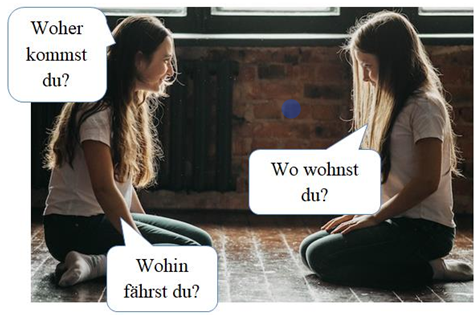In this lesson, you will learn all about prepositions of place in German, what prepositions they are, how and when they are used, and with which cases they are used.
Thank you for reading this post, don't forget to subscribe!CONTENTS
What are prepositions of place in German?
German Prepositions of Place
Wo?/Where?
Woher/ Where from?
Wohin/ Where to?/ Direction
What are prepositions of place in German?
It is a type of preposition that refers to place, but it can also refer to direction, movement.
We can ask questions that we can answer with prepositions of place.
Woher? (from where) – We ask about the origin, where someone or something comes from.
Wo? (where?) – We ask about the place, where someone or something is
Wohin? (where?) We ask about the direction, where someone or something is moving.
Prepositions of place are mostly used with the Dative or Accusative.
German Prepositions of Place
Wo? / Where?
Wo?
These prepositions ALWAYS require the Dative case.
- in+ Dative – spaces: im Hause cities: in München countries: in Italien
- an + Dative – upright against/along sth: an der Wand, on the edge of sth: an der Haltestelle
an der Station, on the shore: am Strand - auf + Dative – on a horizontal surface: auf dem Marktplatz, auf dem Tisch , auf dem Boden
- bei + Dative – persons, companies, activities: bei Mona, bei C&A, beim Friseur, beim Picknick
German prepositions of place answer the question wo? (where?) and with them, we MUST use the DATIVE.
an
an + dative + a horizontal surface, we use it with nouns that denote the surface of water and with nouns that have to do with water – der See (lake), die See (sea), das Meer(sea), der Strand (beach), die Küste (coast), …
Ich bin am Strand. – I’m on the beach.
Er ist an der Haltestelle. – He is at the bus stop.
Das Poster hängt an der Wand. – / The poster hangs on the wall
bei
bei + dative + person, company
For example:
Mia ist bei ihrem Opa. – Mia is at her grandpa’s.
Er war heute beim Frisör. – He is at the hairdresser.
Niko arbeitet bei der Firma Westinghouse. – Niko works at the Westinghouse Company.
bei + dativ / in der Nähe von + dativ ( often with verbs: wohnen (live), liegen (lie), sich befinden (be) …)
For example:
Rodha ist ein kleiner Ort bei München. – Rodha is a small place near Munich.
Der Laden befindet sich bei der Kirche. – The store is located next to the church.
auf
auf + open spaces
For example:
Die Kinder spielen auf dem Spielplatz. – The children play in the playground.
Wir machen auf der Insel Korcula Urlaub. – We are on vacation on the island of Korcula.
Meine Großeltern wohnen auf dem Land. – My grandparents live in the countryside.
in
in + country, city ( with no article), this includes buildings and closed rooms as well as limited areas (regions, sides of the world)
For example:
Mia wohnt in Paris. – Mia lives in Paris.
Ich wohne in Großbritannien. – I live in Great Britain.
Exceptions ⚠ : If the Lands are masculine and feminine or plural: in + the definite article in the Dative case + Country
For example:
Ich lebe in der Schweiz/ im Sudan/ in den Niederlanden. – I live in Switzerland/ in Sudan/ in the Netherlands
inerhalb/ außerhalb (inside/ outside)
innerhalb + genitive / innerhalb von + dative
For example:
Innerhalb der Stadt sind Immobilien extrem teuer. – Within the city, real estate is extremely expensive.
Welche Länder liegen innerhalb der EU? – Which countries are within the EU?
außerhalb + genitive / außerhalb von + dative
For example:
Wir wohnen außerhalb von Paris. – We live outside of Paris.
Welche Länder liegen außerhalb der EU? – Which countries are outside of the EU?
Woher? / Where from?
These prepositions ALWAYS require the Dative case.
aus + dative
rooms, cities, countries: aus dem Haus, aus Wien, aus Frankreich
For example:
Er kommt aus Spanien.- He comes from Spain.
Er kommt aus Madrid. – He comes from Madrid.
Er kommt aus dem Bahnhof. – He comes out of the railway station.
Er kommt aus der Bank. – He comes from the bank.
Exceptions ⚠ : If the Lands are masculine and feminine or plural: in + the definite article in the Dative case + Country
Country
For example:
Ich komme aus der Schweiz/ aus dem Sudan/ aus den Niederlanden. – I come from Switzerland/ from Sudan/ from the Netherlands.
von + dative
contacts, water, persons, companies, activities
For example:
vom Strand – from the beach
vom Spielplatz – from the playground
von Mia – from Mia
vom Picknick – from the picnic
von (from)
von + person, place
For example:
Ich komme von Mia. – I come from Mia.
Ich komme vom Arzt. – I come from the doctor.
Ich komme von Bahnhof. – I come from the station.
Ich komme von der Bank. – I come from the bank.
Wohin?/ Where to?/ Direction
These prepositions ALWAYS require the ACCUSATIVE case. There is, however, an exception: zu + Dative.
The prepositions that we have listed with the question WO can also answer the question WOHIN.
The following prepositions express DIRECTION:
nach (to)
nach + country, city
For example:
Ich fahre nach Spanien. – I’m going to Spain.
Ich fliege nach Madrid. – I’m flying to Madrid.
Exceptions ⚠ : If the Lands are masculine and feminine or plural: in + the definite article in the Dative case + Country
For example:
Ich fahre in die Schweiz/ in den Sudan/ in die Niederlande.
countries (with no article):
For example:
Ich fahre morgen nach Italien. – I’m travelling to Italy tomorrow.
Mein Neffe ist gestern nach Spanien gefliegen. – My nephew flew to Spain yesterday.
in + accusative
spaces:
For example:
Ein Hund kommt mir nicht ins Haus!
Wir gehen heute Abend ins Kino.
countries (with article):
For example:
in den Sudan
in die Türkei
in die USA
an + Dative
upright against/along sth:
For example:
Sie hängt das Bild an die Wand.
on the edge of sth:
For example:
Der Lehrer schreibt an die Tafel. – The teacher writes on the blackboard.
Er lehnt die Leiter an den Baum. – He leans the ladder against the tree.
on the shore
For example:
Ich gehe an den Strand. – I’m going to the beach.
Wir fahren ans Meer. – We are travelling to the sea.
auf + accusative
on a horizontal surface, water:
Meine Mutter geht sonntags auf den Marktplatz. – My mum goes to the marketplace on Sundays.
Ich lege mein Handy auf den Tisch. – I put my mobile phone on the table.
Das Glas ist auf den Boden gefallen. – The glass has fallen to the floor.
⚠ zu + dative ⚠
persons, companies, activities, places:
Wir gehen heute Nachmittag zu Mia. – We’re going to Mia’s this afternoon.
Jeden Morgen gehe ich zu Aldi. – I go to Aldi every morning.
Samstags gehe ich zum Friseur. – I go to the hairdresser on Saturdays.
Ich gehe zum Laden. – I’m going to the store.
Ich gehe zur Apotheke. – I’m going to the pharmacy.
um (around)
um + akuzativ
For example:
Gehen Sie um die Ecke (herum). – Go around the corner.
Sie läuft um den Spielplatz (herum). – She runs around the playground
durch (through)
durch + accusative
For example:
Sie läuft durch den Park. – She walks through the park.
Wir fahren durch die Zentrum. – We drive through the center.
entlang (along)
entlang (stand after the noun) + accusative
For example:
Gehen Sie die Böhmstraße entlang. – Walk along Böhmstraße.
Sie läuft den Fluß entlag. – She runs along the river.
See more:



